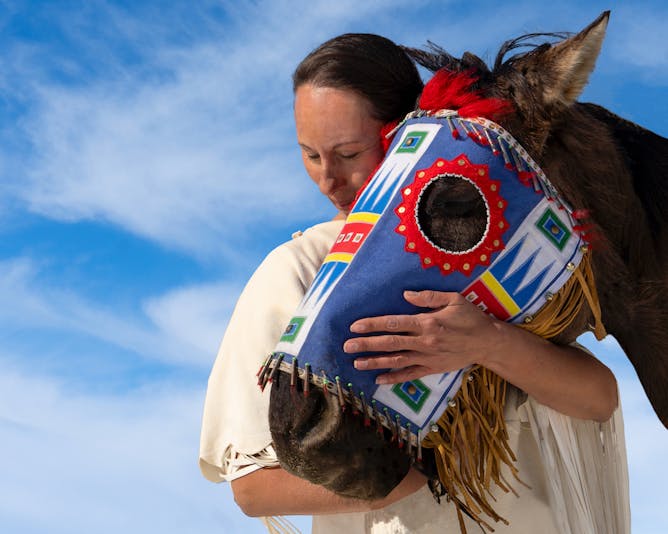|
Horses have been an important part of North American Indigenous cultures for a very long time. But the histories written by European colonists and the oral traditions of Indigenous peoples haven’t agreed on just how long.
To learn more about how far back the human-horse story stretches in the American West, University of Colorado Boulder archaeozoologist William Taylor joined forces with Lakota scientist Yvette Running Horse Collin, a postdoctoral genomics researcher at a French university. With their multidisciplinary team, they turned to the old bones of horses in museum collections.
Using the tools of archaeology – osteological, genomic, isotopic, radiocarbon and paleopathological analysis – they found evidence that revises the dominant account of horses in the Rockies and Great Plains and supports the narratives told by tribal historians and elders.
Also today:
Last night we sent a breaking news alert that wrongly stated the timing of former President Trump’s indictment, stating it was “yesterday” instead of “today” in the editor’s note. We apologize for the mistake.
|

Horses are an active part of life for the Lakota and many other Plains nations today.
Jacquelyn Córdova/Northern Vision Productions
William Taylor, University of Colorado Boulder; Yvette Running Horse Collin, Université de Toulouse III – Paul Sabatier
European colonists chronicled their version of how Indigenous peoples lived with horses. New collaborative research adds scientific detail to Indigenous narratives that tell a different story.
|
Politics + Society
|
-
Stefanie Lindquist, Arizona State University
With a grand jury indictment of former President and current presidential candidate Donald Trump, a legal scholar explores what the law says about the consequences of such an unprecedented act.
-
Shannon Bow O'Brien, The University of Texas at Austin
Trump’s indictment will force Americans to grapple with the exact role of presidents – and limits of their power.
-
Willow Kreutzer, University of Iowa; Stephen Bagwell, University of Missouri-St. Louis
When government responses to a natural disaster do not address the specific needs and vulnerabilities of women and girls, women tend to lose trust in the institutions.
|
|
Health + Medicine
|
-
Sydney Hartman-Munick, UMass Chan Medical School
Eating disorders in teens are common and dangerous, and parents and loved ones play a crucial role in helping to both identify concerning behaviors and promote healthy ones.
-
Jennifer R. Grandis, University of California, San Francisco
After decades of effort to reduce discrimination in the workplace, a cultural change may be happening that will enable people to move past their unconscious biases.
|
|
Ethics + Religion
|
-
Joanne M. Pierce, College of the Holy Cross
Donkeys and palm leaves are both associated with Christianity’s Palm Sunday – but their symbolism couldn’t be more different.
-
Molly Jackson, The Conversation
The Passover Seder has tradition and remembrance at its core, but has also evolved throughout the centuries in Jewish communities around the world.
|
|
Podcast 🎙️
|
-
Nehal El-Hadi, The Conversation; Daniel Merino, The Conversation
With the proliferation of social media platforms, smart devices and apps, the demands on our attention have never been greater. But how is this affecting our ability to process and retain information?
|
|
|
|